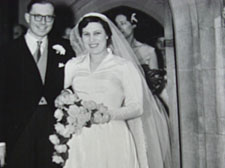|
|
 |
| |

Rachel and husband Edward |
Secret past of Churchill’s goose ‘who never cackled’
Peter Gruner meets a woman whose work helped turn the tide in the Second World War but is only now being recognised
FOR years her main claim to fame may have been that she was a JP and an active community volunteer. She is also the mother-in-law of Emily Thornberry, MP for Islington South and Finsbury.
But this week Hampstead pensioner Rachel Nugee, 82, has revealed a secret past as one of the Second World War’s legendary code breakers.
Mrs Nugee deciphered codes for the war effort at Bletchley Park in Buckinghamshire, the government’s communications centre, famously portrayed in the book by Robert Harris and feature film The Enigma Code, starring Kate Winslet.
For more than 30 years after the war Mrs Nugee was bound by the Official Secrets Act and couldn’t reveal details of her work, even to her own family. But now she is among up to 5,000 surviving code breakers who are to be honoured with a gold badge by the government for their work, which helped to tip the balance of the war in Britain’s favour.
Mrs Nugee was just 17 and a bright and rebellious pupil at top girl’s school Roedean when she was asked to go to Bletchley.
“If my parents needed to give permission I didn’t know about it,” she said. “But I’m sure they were very proud I was doing something for the war effort.”
Code breakers worked long hours and were advised not to contact family unless there was an emergency. “I did tell my mother what I was doing and she kept it very quiet,” Mrs Nugee added. She believes one of the reasons she was recruited may have been because her father, a refugee who spoke excellent French and good German, was a member of the British intelligence corps serving in France. “So it was all very much in the family,” she said.
Rather than the British, it was the Americans who finally broke the silence about what went on at Bletchley. Mrs Nugee said: “I was very angry that they broke the secrecy act. It was a point of principle. You signed the act and you should abide by it. It’s permanent and for always. Winston Churchill called us the ‘geese who never cackled’.”
After the war she went Oxford University and married Edward Nugee in 1955. At 81, he is still a practising barrister and until recently was a deputy High Court judge. They have just celebrated their golden wedding anniversary at the Parish church of St John at Hampstead.
They have four children, including Christopher, who is a judge and Emily Thornberry’s husband. Mrs Nugee has 11 grandchildren aged from 10 to 19.
As well as being a JP for 25 years, she was International President of the Mothers Union, in which capacity she travelled extensively, raising awareness of poor living conditions. She was also a trustee with the Grandparents Association, a campaigning group calling for access rights for grandparents in family break ups.
A former member of the hospital watchdog, the House Committee of the Royal Free, when the hospital was in Gray’s Inn Road, she is not always a fan of the NHS.
Mrs Nugee, who lives in Pond Street close to the present Royal Free, recounts an incident when she was admitted to the hospital after suffering a dizzy spell and went without food an entire day. “It was only after a visitor came to see me that they realised I’d not eaten a thing.”
She is also highly critical of the GP system, in which patients, instead of seeing their own doctor who may have known them and their ailments for years, are forced to see the first medic who becomes available.
Speaking about the lessons that people today can learn from her experiences, she added: “We’re not a cohesive society. We’re very disparate and self centered. What I wanted to do at 17 was to get into that war and fight it. That sense of identity and service to one’s country doesn’t seem to always exist today.”
No one is more proud of Rachel Nugee than her large family. Emily Thornberry said: “The children love her to bits. She’s a great inspiration. We’ve had a big family visit to Bletchley, where Rachel showed us where she worked and what she did. Rachel is of a generation of women who were reliable, and got on with the job in hand. She didn’t expect any glory. She just did her bit.”
More than 10,000 people worked at Bletchley Park in regimented conditions. They were selected for their linguistic and mathematical abilities. One recruitment test was the ability to solve the Daily Telegraph crossword in less than 12 minutes. While a few of the analysts who broke the Enigma and Lorenz codes knew what their work was achieving, most had no idea. For the majority of staff at what was known for a while as Station X, their work involved handling vast quantities of indecipherable German signals and processing those using machines designed for the purpose.
It was at Bletchley Park that the team led by Alan Turing broke the Enigma code that helped the allies stem the losses in the Atlantic convoys. Code breaking also played a central role in the D-Day landings. |

|
 |
| |
|
 |
|

